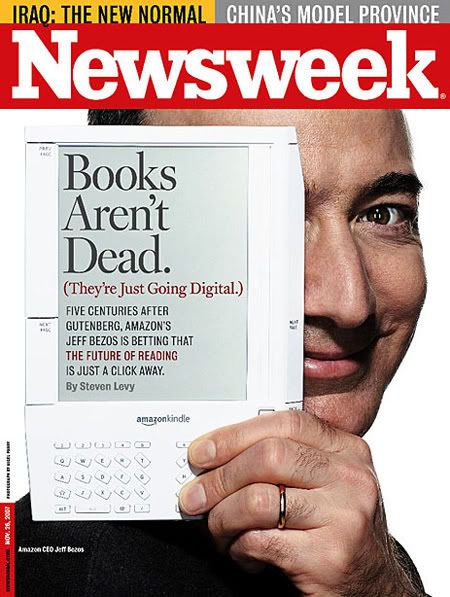
Anounced earlier this week in New York by CEO Jeff Bezos, the Amazon “Kindle” (strange echo of Farenheit 451 when you think about it) is coming out. They call it a “reader”. It looks like a small tablet, permanently connected to internet and can hold as many as 200 works in its hard drive.
Access is made possible via Whispernet, a high-speed data network related to Sprint, which allows you to connect everywhere, and is therefore not geographically restricted to WiFi access points. Subscription, which is normally 60 dollars a month, should be free.
As for the object itself, it weighs a little less than 300 grams (even after years of living in the US, I still have to use the metric system), the screen is tad bigger than 15 cm. The device comes with a battery that allows 30 hours of continuous reading, a keyboard to annotate the texts, exchange emails, google stuff and surf the www. Provided by e-link , the display technology is the same as Sony Reader. Instead of adopting new (and better) standards, Amazon has unfortunatly stuck to the Mobipocket (a French firm it acquired in 2005) format. In terms of look and design, it's not exactly uber-cute, but Steven Levy who tried it for a few weeks (his feature article is on the cover of Newsweek) says people who handled it liked it, so why not. It also provides an email address through which you can receive documents, which means you can read them on the device (but the supported formats are noticeably scarce). Not only can books be downloaded (within about one minute), but also magazines and newspapers (Le Monde, the New York Times and the Wall Street Journal) and even blogs (for which they’ll charge a fee, which is not making everybody happy, far from it) . The texts stored on the device are searchable, the same way as they are on internet. The first chapters of most available books are free.
A few testers have already reviewed the product: BoingBoing and PaidContent whose conclusion is kind of interesting: “Bezos’ speech had most of the audience pretty enthusiastic about the device—the problem is the gap between the description and the device itself.” Joseph Weisenthal writes becore concluding: “With some improvements to the display and a more intuitive navigation system, it could become an attractive product, even at the price” [$400... not exactly a paltry sum, to say the least].

Predictably, the launch of this new electronic device has stirred quite a bit of controversy and is generating a lot of talk about the future of the book.
In the current issue of Newsweek (it hit the headlines) Steven Levy emphasizes the numerous assets of the connected book, the interconnected texts, the book as process rather than product, and so on and so forth. He quotes from several sources – among which/whom Kevin Kelly.
As sharp as his usal self, Nicholas Carr observes that Jeff Bezos doesn’t say anything about these futuristic ramblings (that Carr seems to despise) and gives a very classical (conservative?) idea of his love for books when he writes about the launch of the Kindle:
“I love slipping into a comfortable chair for a long read - as I relax into the chair, I also relax into the author’s words, stories, and ideas. The physical book is so elegant that the artifact itself disappears into the background. The paper, glue, ink, and stitching that make up the book vanish, and what remains is the author’s world.”
For Carr, there is no doubt that Kevin Kelly is wrong when he writes that the major virtue of the Kindle is that it is always connected and that “this ability to interact, manipulate, shape, cut, clip, annotate, and mash up is what will keep books great.” On the contrary, Carr declares that “the only thing that will keep books great is respect for the individual author, the individual reader, and the sanctity of the book as a closed container.”
As far I am concerned, if I were to buy the device, it would be out of desire to find a type of pleasure that can be compared with the one Bezos talked about, and also to see new modalities of reading emerge, and concomitantly new forms of literature.
The extraordinary perennity and strength of the book comes largly from the fact that it has refined, tailored, improved, developed for more than five centuries. The opportunity to reinvent it doesn’t occur every day.
It’s not for lack of attempts but the e-book has never taken off. The book as object is a formidable challenge. The question is therefore: how can Amazon succeed where Sony and everybody else have failed.
Perhaps because it is precisely Amazon we’re talking about. They have the means and the audacity to change their own business model. The goal seems to transform the sales of books-as-objects into books-as-flows. “This isn’t a device, it’s a service” Bezos said in the pages of Newsweek. This is why we can speak about “Book 2.0”.
Kindle will start off with a library of 88.000 titles. Being able to download them all at any time is a huge advantage over previous e-book-related ventures. Some people have even mentioned the possibility of an agreement with the chain of W hotels, which would make it possible for customers to borrow (or rent) a machine to read the books of their pick. Quite an improvement over the rental of dime-a-dozen action-packed flicks or pornography.
The cost really is the main question/concern. At 400 dollars a piece, you can hesitate between buying a Kindle, a Wii, two Negroponte laptops (read here, a Nokia N800 or an EEE, the latest ultra-light Asus notebook.) Besides, these machines allow you to do a whole bunch of other things.
The main and true problem of the pricing has less to do with the device itself than with service and the cost of each item. The available titles at the time of the release are around $10. Amazon stands out of the mass of publishers that still sell e-books at the same price as their paper counterparts. If you bear in mind that many books published these days are systematically dgitalized, and that storage and shipping are practically free, it would be natural to expect many readers to demand even lower costs.
Part of the success or failure of the Kindle is at stake on this particular point. But this is not the most important aspect. It could contribute to the success of e-books and sure enough, some attention should be paid to this.
The most important thing is that hundreds of gadgets with the capacity to connect to internet and a screen wider than a cell phone’s are scheduled to come out in the following months. The iPod Touch is an interesting case since it has extraodinary legibility and also comes with a wireless connecting capacity, so that it’s easy to imagine that iTunes might consider offering cheap e-books – Steve Jobs has understood the importance of pricing every single item. this could be the beginning of a tipping point.
The future of the book is pretty much happening now... or so it seems


No comments:
Post a Comment